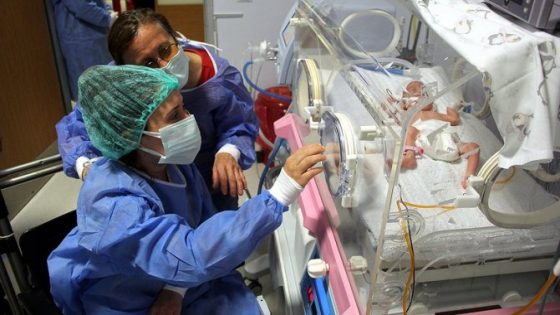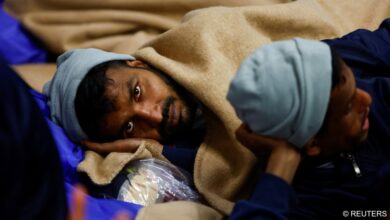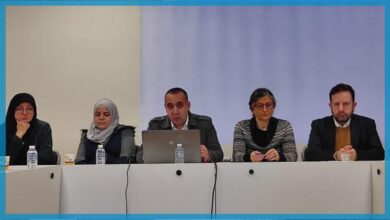Newborns of Syrian… The new title of incitement by the opposition in Turkey

Adnan Abdul Razzaq wrote in “alaraby”
Fears of demographic change and the birth of Syrians in Turkey have reached the point of launching campaigns in the recent period, claiming that there are no places in the intensive care units in hospitals in the state of Hatay, which is adjacent to the border with Syria, as a result of the large number of Syrian births.
On September 6, the Turkish website, Son Huber, quoted citizens as saying that “two newborn Turkish children were transferred to a hospital outside the state due to the lack of two places for them in the intensive care rooms, while the same day witnessed the birth of 60 Syrian children in the state, For these two Turkish children only.”
However, the Hatay Health Directorate, in a statement issued, denied these allegations, which were widely spread on social media, and announced that “on September 6, 68 children were born, including only 30 Syrian children.” It is noteworthy that this official statement, which denied the allegations, did not stop the ongoing campaigns that address the negative effects of the increase in the number of Syrian births. The official government statistics authority was forced to reveal the full number of Syrian births since the beginning of their asylum in Turkey in 2011 until mid-September.
The Commission announced the birth of 754,000 Syrian children in Turkey since the beginning of the Syrians’ asylum, explaining that “these births constitute only 8 percent of the number of births in the country,” and commented that “this percentage is normal, and does not call for statements issued by opposition parties, inciting people to On the Syrians, by exaggerating the number of their births.”
In an interview, the Turkish researcher Fayza Lynel believes that “what is said about the percentage of Syrians born in Turkey is greatly exaggerated, but it is actually higher than that of Turkish births compared to the number of Syrians, because birth control in Turkey continues, despite the government encouraging people to have children, and giving them gifts Money for the second and third children. Most Turkish families are satisfied with two children, or perhaps one child, while Syrian families in Turkey have four or more children, especially in border areas such as Hatay and Urfa.
The Turkish opposition claims that between 70 and 80 percent of those born in Hatay are Syrians, “which is likely to increase the number of Syrians in the future, or perhaps to exceed the number of Turks in the state,” prompting the governor of Hatay, Rahmi Dogan, to respond that “people are manipulating Exaggeratedly, the number of Syrian refugees living in Hatay, in order to distort the facts.”
In a statement carried by the Turkish agency DHE last September, he confirmed that “the population of Hatay is 1.6 million, including 429,121 Syrians registered under temporary protection. As for the actual residents of Hatay, according to the latest statistics, their number is 370,260, which means that the Syrians in the state constitute 18.14 percent of the total population.
The Turks fear that the Syrians will become a majority in the border states (Ozan Kochi/AFP)
Regarding the birth rate, Dogan adds, “The claim that 70 to 80 percent of the children born in the state are Syrian is completely wrong, and represents a distortion and manipulation of numbers. During the period between June 2021 and June 2022, the number of births reached 32,782, including 22,779 Turks, and about 10,000 Syrian children, and therefore Syrian children constituted only a quarter of the births in the state.”
But Lynell believes that “these percentages are high, although they deny the exaggerations in the alleged numbers,” noting that some births are not registered because Syrian parents do not have official papers to confirm the marriage, or that a marriage occurs below the age specified by Turkish law. Some Syrian women marry in The age of less than eighteen, which prevents the registration of the newborn that violates Turkish law, and imposes a penalty on the husband and the father of the bride.”
But she also notes that “whether there are many or few births, it does not provide an excuse for some to raise the tone of racist discourses against refugees.” And it calls for “to address the issue from its roots and not to bully some, especially since Turkish President Recep Tayyip Erdogan recently stated in New York City that the plan for the voluntary return of Syrians has begun, and that its first phase aims to return a million refugees to Syria.” These measures are the required solution, not attacking the Syrians and turning them into an electoral card. The racism led by some opposition parties harms Turkey on the social and economic levels.”
The density of Syrian refugees varies from one province to another in Turkey. The number of people who hold temporary protection cards “Kimlik” is 3.6 million, according to official statistics, and they are located in all states, which constitutes 4 percent of the population, but their largest concentration point is in the city of Istanbul with more than half a million, and then in the nearby southern states. About a million and a half from the Syrian borders are distributed in the governorates of Gaziantep, Kilis, Hatay and Urfa, while only about 56 thousand Syrians remain in the camps, according to the statistics of the Turkish Immigration Department, who are staying in the states of Adana, Hatay, Kahramanmaraş, Kilis and Osmaniye.
This prompted Turkey last year to start distributing Syrians to states, closing restrictions, and preventing their movement to states that host large numbers of them.
Shaukat Aksoy, a former worker in the Directorate of Migration, says, “Turkish parties, whether those in power or belonging to the opposition, use the Syrian refugee card. What was recently released about the number of Syrian births in Turkey greatly affects the Turkish street, which, as a result of continuous incitement, began to fear that the Syrians would become a majority, and cause demographic changes, especially in the border states.
Not many Syrians remained in the Turkish camps (Elif Ozturk / Anatolia)
Aksoy does not deny the existence of exaggerations in the numbers of Syrian refugees, and an increase in the tone of incitement against them, with political dimensions related to the elections, and the change of political positions in the region, because Turkey has not known any hostility to refugees in its history.
If we look at the map of immigration to Turkey after the establishment of the republic only, we find that about 1.6 million came from Greece after the Treaty of Lausanne in 1923, and more than 300,000 from the former Yugoslavia after the immigration agreement between the two countries in 1953. About 800,000 refugees came from Bulgaria Tens of thousands of refugees from Romania were resettled, and Turkey received one million Iranians after the 1979 revolution, and others arrived in its lands after the war in Afghanistan, until it received Arabs after 2011.
Aksoy reveals that the most important opponents of the Syrian presence today are the refugees themselves. The leader of the “iyi” party, Mireille Aksener, is of Greek origin and comes from Thessaloniki, and Eli Aksoy, who led a campaign against the Syrian presence before the 2018 elections, is from Cyprus. Also among the most important names that oppose the Syrian presence, the head of the “Zefar” party, Umit Ozdag, was born in the Japanese city of Tokyo, and his father is of Dagestan origin. He immigrated to Turkey and stayed there before he died in Ankara in 2002.
For his part, Turkish analyst Alaeddin Şenguller describes the opposition’s use of the Syrian birth card and the “scarecrow” to intimidate the demographic change as “an immoral campaign based on incorrect accusations, as the official figures are clear, and deny the increase in the number of Syrian births.” He adds in his speech, “The opposition wants to gain access to power in any way, even if it causes chaos and adopts misleading and false methods. During this period, the Syrian refugees seem to be the weakest link around which everyone converges.”




